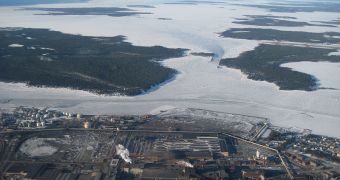Facebook officials have decided to build their new headquarters in Sweden, 100 km far from the Arctic Circle, taking into consideration the location's potential which would allow the company to rely on renewable sources of energy and low temperatures to keep its servers cool.
The new headquarter will occupy approximately 30,000 square metres , about the size of 11 football pitches and will strongly depend on green sources of energy. Studies have shown that each datacenter belonging to Facebook uses as much power as needed to power 30,000 households.
Major companies such as Facebook, Google and Amazon are one of the worlds' main electricity consumers. Even more alarming appears to be the fact that in only 3 years, from 2007 to 2010, their needs in terms of energy have increased by 40%.
This spring, Greenpeace suggested that Facebook's data is “dirty,” relying its statement on the fact that 53.2 per cent of the enterprises' power is produced in coal burning processes.
Greenpeace introduced and supported several Stop Coal Initiatives. One action of this kind involved Facebook, when an Unfriend Coal campaign was developed and sustained by 700,000 participants.
Nowadays, it seems that the company wants to clean up and rehabilitate its name. Therefore, Facebook chose Luleå out of 100 sites in Europe.
The small town of 74,000 inhabitants was the best candidate for the job, considering its beneficial temperatures and also its significant hydroelectric power resources.
“ We concluded that Luleå offered the best package of resources, including a suitable climate for environmental cooling, clean power resources, available land, talented regional workforce and supportive business and corporate environment,” declared Tom Furlong, Facebook's director of site operations.
Greenpeace officials were excited to hear about this radical change in Facebook's behavior. It seems that, by opening the new headquarter in Luleå, the company has considerably improved its position among the list of eco-conscious major companies.
Further more, representatives from the environmental organization think that Facebook's action will set an example among its competitors on the IT market.
“This will send a important signal to IT companies and electricity providers that want to compete for future Facebook business.” concluded the Greenpeace officials.

 14 DAY TRIAL //
14 DAY TRIAL //